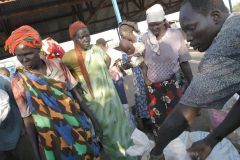UN, Sudan to help 150,000 return to south
Nov 16, 2006 (KHARTOUM) — Sudan and the United Nations will help some 150,000 refugees return to the south over the next year in the first large-scale repatriation since the end of the country’s civil war nearly two years ago, the U.N. said Thursday.
 The refugees are among some 4 million people who fled southern Sudan during the nearly 20-year-log war between rebels and the Khartoum government, many of them crowding into camps and shantitowns around the capital or elsewhere in northern Sudan.
The refugees are among some 4 million people who fled southern Sudan during the nearly 20-year-log war between rebels and the Khartoum government, many of them crowding into camps and shantitowns around the capital or elsewhere in northern Sudan.
Under the peace deal, signed in January 2005, the U.N. and government are to facilitate the return of all southerners who wish to go back before a referendum set for 2011 in the south on whether to remain part of Sudan or to secede.
In a first phase, the U.N., the central Sudanese government and the autonomous government in the south will help 150,000 return by December 2007, Marietha Dos Santos, a spokeswoman for the U.N. mission in Sudan’s reintegration division, told The Associated Press.
The International Organization for Migration will lead the effort, setting up 35 registration centers around Khartoum and sending mobile registration teams to other areas to allow those who to return to sign up. Registrations will begin Sunday.
The returns will take place until March, just before the beginning of the rainy season — which makes movement in the south more difficult — then will resume again in the fall.
“Our aim is to ensure the organized return is safe, and that it is sustainable. The living conditions of receiving communities should not be undermined by the arrival of large numbers of returnees,” Dos Santos said.
The January 2005 peace deal ended the long conflict that pitted rebels from the mainly Christian or animist south against the Arab Muslim-led Khartoum government.
At least 40,000 southern Sudanese returned on their own earlier this year, particularly to the area of Abyei, a disputed oil-rich area between northern Sudan’s Kordufan region and the Bahar Ghazal region of southern Sudan.
U.N. agencies provide them help — including transportation and, once the returnees arrive, food aid and assistance in finding new livelihoods and reintegrating into their villages.
But the new plan will be the first effort by the U.N. and Sudanese government to organize a large-scale return.
Sudanese Humanitarian Affairs Minister Kosti Manibi told the official Sudan News Agency that the return program will “boost the process of peace, stability and development” in the wake of the peace agreement.
The U.N. has promised $100 million to fund the voluntary returns program.
According to the Ministry of Humanitarian Affairs, 63 percent of southern Sudanese in Khartoum have expressed desire to return to their home areas as soon as possible, and another 25 percent have shown desire to return later. Around 12 percent said they did not want to return back to the south.
(AP)
